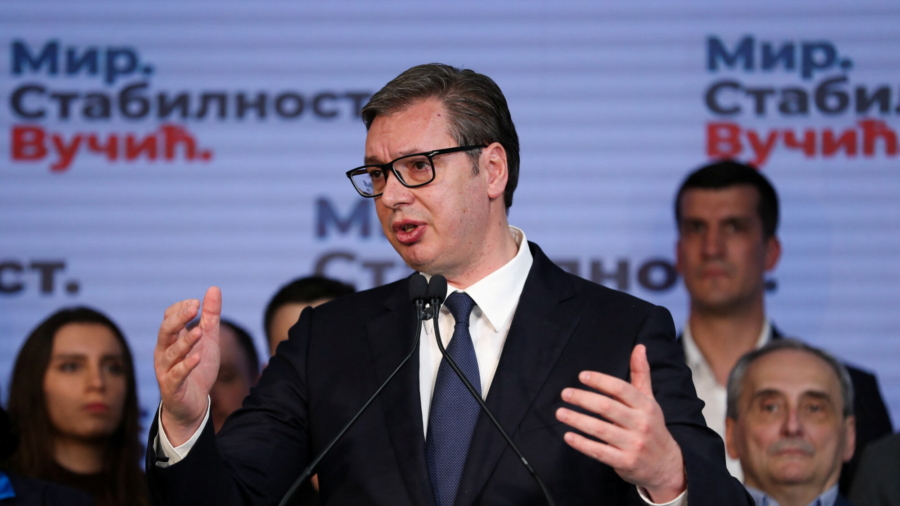BELGRADE—Serbia’s incumbent President Aleksandar Vucic is set to win the presidential vote on Sunday with 59.8 percent of the votes, according to a projection by pollsters Ipsos and CeSID, based on a sample of the partial polling station count.
Zdravko Ponos, a retired army general representing the Alliance for Victory coalition, is set to come second with 17.1 percent of the votes.
In the parliamentary vote Vucic’s Serbian Progressive Party (SNS) is set to come first with 43.6 percent of votes, Ipsos and CeSID projections showed.
The United for Victory opposition alliance trailed behind with 12.9 percent of the votes.
The Socialist Party of Serbia, a long-time ally of the SNS, is seen third with 11.6 percent of the votes. The Nada (Hope) coalition and Moramo (We Must), an alliance of green movements and parties, garnered around 5.4 percent and 4.3 percent of votes respectively.
As the SNS would likely fail to secure enough of the 250-seat parliament to rule alone, it will have to seek coalition partners.
According to the State Election Commission preliminary data, turnout stood at 58.54 percent.
Vucic ran for a second five-year term on a promise of peace and stability just as Russia invaded Ukraine on Feb 24, which has put Serbia under pressure from the West to choose between its traditional ties with Moscow and aspirations to join the European Union (EU).
Vucic acknowledged conflict in Ukraine impacted the campaign and said Serbia has no plans to deviate from its balancing game between the EU membership bid and close ties with Russia and China, a major investor.
“We will maintain policy that is important for the Europeans, Russians, and Americans, and that is … military neutrality.”
“Serbia will try to preserve friendly and partnership relations in many areas with the Russian Federation,” Vucic said.
Serbia is almost entirely dependent on Russian gas, while its army maintains ties with Russia’s military.
The Kremlin also supports Belgrade’s opposition to the independence of Kosovo by blocking its membership to the United Nations.
Although Serbia backed two United Nations resolutions condemning Russia’s invasion of Ukraine, it refused to impose sanctions against Moscow.
CeSID and CRTA pollsters reported several irregularities, including photographing of ballots.
The opposition largely boycotted a parliamentary election in 2020, allowing Vucic’s SNS party and its allies to secure 188 seats in the 250-seat parliament.


